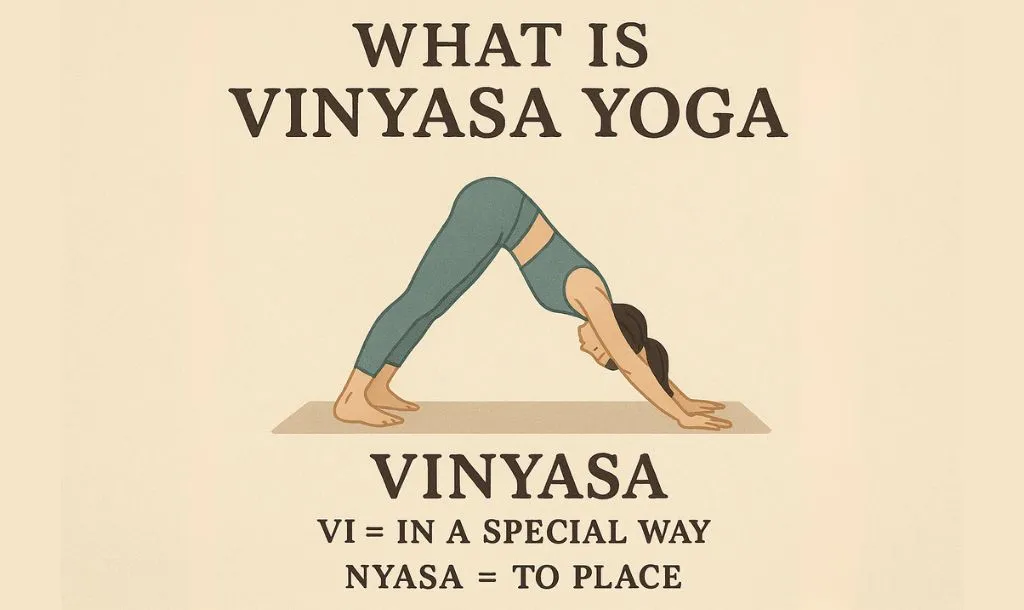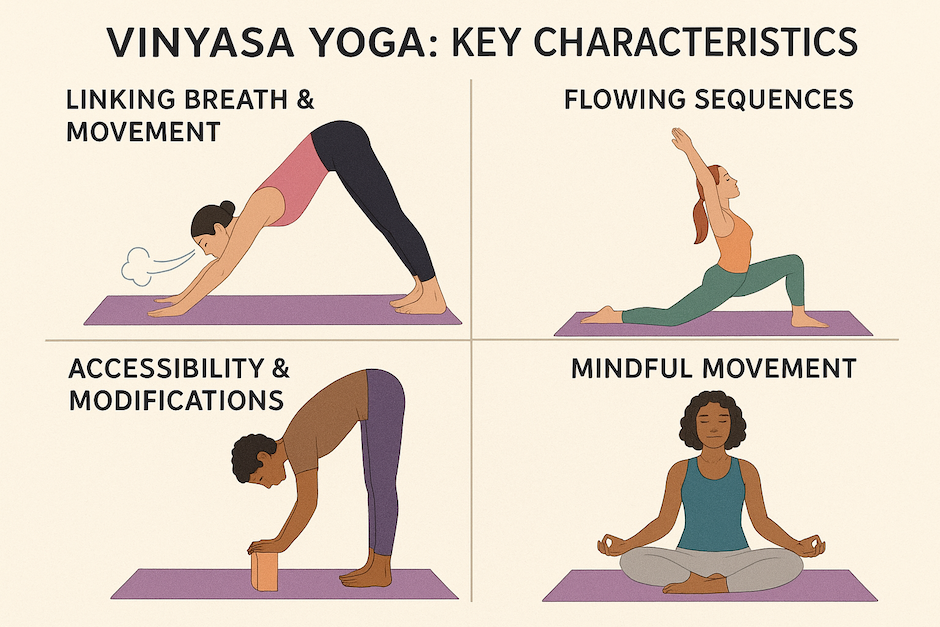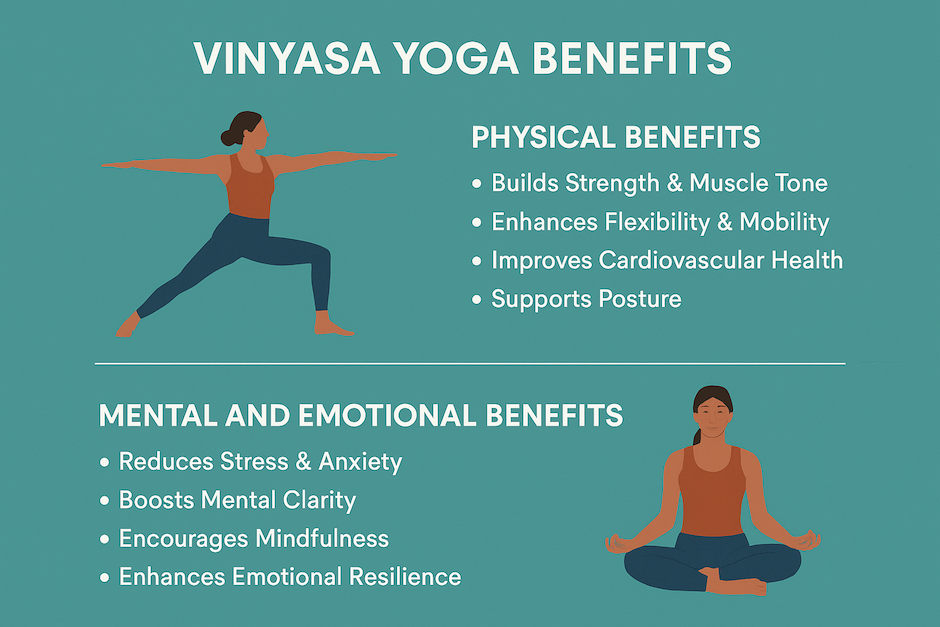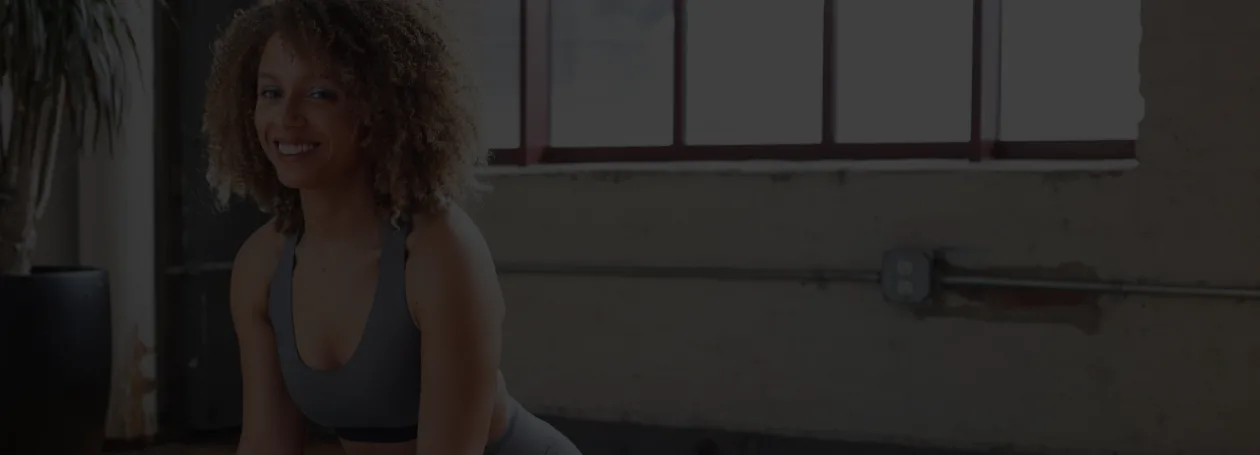

If you’ve ever wondered what is Vinyasa Yoga and why it’s become one of the most popular yoga styles worldwide, you’re in the right place.
Vinyasa Yoga is a dynamic yoga style that links movement with breath in flowing sequences. Each pose flows smoothly into the next, guided by your inhalations and exhalations, creating a moving meditation that strengthens the body and calms the mind. It's accessible, adaptable, and offers a uniquely creative experience every time you step on the mat.
This comprehensive guide will walk you through its deep roots in tradition, how it evolved into the modern practice we know today, and why so many practitioners—from complete beginners to seasoned yogis—choose Vinyasa for their yoga journey.
To experience and learn Vinyasa Yoga in its most authentic form, book a free 1-on-1 session today!
Vinyasa Yoga is a dynamic style of yoga that synchronizes breath with flowing movements, creating sequences that smoothly transition from one pose to another. The word “Vinyasa” comes from Sanskrit—“Vi” meaning “in a special way,” and “Nyasa” meaning “to place.” This highlights the intentional arrangement of poses to create a mindful and continuous flow.
At its core, Vinyasa Yoga is about physical and energetic flow. Each movement is guided by an inhale or exhale, creating a rhythm that turns your practice into a moving meditation. This constant linking of breath and movement helps cultivate presence, focus, and internal awareness, creating a holistic experience for the mind and the body.
Unlike more structured yoga systems like Ashtanga, which follow a set sequence of poses, Vinyasa is flexible and creative. No two classes are exactly the same. A yoga coach may sequence poses to emphasize strength, balance, flexibility, or emotional release, tailoring each session to suit the student.
Learn the differences between Ashtanga and Vinyasa Yoga here!
While Vinyasa can be physically demanding, it’s also incredibly adaptable and inclusive. Modifications, use of props, and varied pacing make it suitable for beginners, intermediate practitioners, and even those returning to yoga after a break.
Vinyasa yoga, as it stands today, has its roots in history and tradition.
While the term “Vinyasa” doesn’t appear in early yoga scriptures, the concept of intentional, breath-linked movement aligns closely with classical teachings found in texts like the Yoga Sutras of Patanjali. These texts emphasized the importance of mindful movement (asana) and breath control (pranayama) as pathways to spiritual awareness.
In the 20th century, Tirumalai Krishnamacharya, often referred to as the father of modern yoga, developed a breath-synchronized practice that became the foundation for what we now call Vinyasa Yoga. His teachings combined classical philosophy with a strong emphasis on movement, breath, and individualized instruction, which are key elements that define Vinyasa today.
Krishnamacharya's influence extended through his students, including Pattabhi Jois (who founded Ashtanga Yoga) and B.K.S. Iyengar. Vinyasa continued to evolve as an offshoot of these more structured systems, offering creativity while staying grounded in tradition.
During the late 20th and early 21st centuries, Vinyasa Yoga began to take on a distinct identity in the West. Modern Vinyasa emphasized creative sequencing and adaptability, resonating with Western students seeking both physical challenge and mental clarity.
Today, it has become a go-to style for modern yoga practitioners because it blends structure with freedom, effort with ease, and breath with movement. It’s not just a workout, but a way to build awareness, resilience, and peace of mind through intentional, flowing practice.
To experience the perfect blend of classical wisdom and modern flexibility, book a free 1-on-1 session with an Indian yoga coach at MyYogaTeacher. Our coaches offer accessible, authentic instruction that respects the lineage while embracing innovation.

Let’s understand the key features that make Vinyasa Yoga what it is:
At the heart of Vinyasa Yoga lies a powerful principle: linking breath with movement. This intentional breathing turns physical practice into a mindful, meditative flow.
Key elements:
Your breath sets the pace and quality of your experience on the mat.
Unlike fixed-sequence styles like Ashtanga or Bikram, Vinyasa encourages creativity in how poses are linked.
What makes Vinyasa flow unique:
This flexibility keeps the practice engaging, personalized, and creative.
Though dynamic, Vinyasa is easily modified to suit all levels.
Why it's accessible:
Ideal for:
Vinyasa is a moving meditation grounded in presence and awareness.
Philosophical foundations:
This mindful approach reflects yoga’s deeper goal: to integrate body, mind, and spirit, promoting balance and self-discovery, not just fitness.
Want to experience the benefits of this dynamic practice first-hand? Book this beginner-friendly group class on Vinyasa Yoga today!
Vinyasa Yoga is incredibly versatile, which has led to the development of several distinct sub-styles. These variations differ in pace, intensity, and intention, allowing you to choose a style that matches your goals and energy levels.
Power Vinyasa Yoga is a vigorous, fitness-oriented form of Vinyasa. It incorporates strength-building poses, longer holds, and faster transitions to create a physically intense workout. This style is especially popular in Western studios and often integrates elements of strength training and cardiovascular conditioning.
It’s ideal for:
Power Vinyasa classes often emphasize alignment, core strength, and flowing sequences that test both balance and willpower. Try this group class on Power Vinyasa!
Hot Vinyasa Yoga is practiced in a heated room, typically ranging from 85°F to 105°F (29°C to 40°C). The added heat increases flexibility, enhances circulation, and supports detoxification through sweat.
Benefits of hot Vinyasa include:
That said, it’s important to stay hydrated and listen to your body.
Gentle Vinyasa Flow slows things down. While it maintains the breath-movement connection, transitions are smoother, and poses are held for longer, making it more accessible to beginners, older adults, or those seeking a meditative practice.
What to expect:
It’s a great starting point for new practitioners or anyone needing a nurturing, low-impact yoga session.
Explore our various Vinyasa Yoga Classes here!
With so many yoga styles available, it’s natural to wonder what sets Vinyasa apart. While it shares foundational principles with other forms of yoga, Vinyasa is known for its fluidity, creativity, and breath-driven movement.
Here’s a comparison with some well-known yoga styles:
Explore our detailed guide on the Differences between Hatha and Vinyasa Yoga here!
Learn more in our detailed breakdown: Ashtanga vs Vinyasa Yoga!

Vinyasa Yoga offers a wide range of physical, mental, and emotional benefits—making it one of the most well-rounded styles of yoga available today. Whether you're stepping onto the mat for fitness, stress relief, or spiritual growth, Vinyasa has something to offer.
The combination of breath, movement, and meditation helps regulate your mood and fosters a greater connection to your body and mind.
You don’t need to be flexible or experienced to start practicing Vinyasa Yoga. All it takes is an open mind, a willingness to move with your breath, and the right guidance to support you.
With a skilled and experienced yoga coach, you can:
Whether you're new to yoga or looking to refresh your practice, our personalized sessions help you grow with confidence and clarity.
Book your free 1-on-1 session today and explore Vinyasa Yoga in its most authentic and empowering form!
Vinyasa comes from the Sanskrit words “Vi” (in a special way) and “Nyasa” (to place). Together, it means “to place in a special way,” referring to the intentional sequencing of yoga poses, linked together by breath.
Yes! Vinyasa yoga is highly adaptable and beginner-friendly when taught with proper modifications. It helps build strength, flexibility, and body awareness, making it a great entry point into yoga.
“Vinyasa” and “flow yoga” are often used interchangeably. Both refer to the fluid transitions between poses guided by breath. However, “Vinyasa” typically denotes a deeper lineage and more structured teacher training.
Beginners can start with 2–3 sessions per week. As you build strength and familiarity, you may increase to 4–6 times per week. The key is consistency, not intensity.

Receive personalized guidance tailored to your unique fitness goals, live with a dedicated coach—no credit card required.